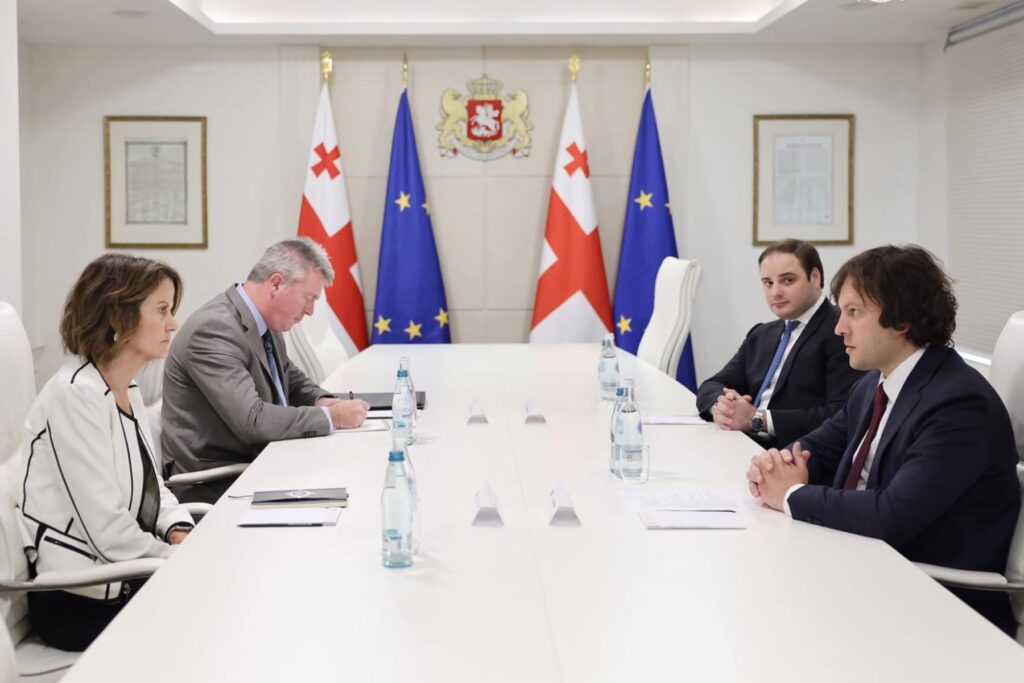Georgian Prime Minister Irakli Kobakhidze has said that he believed US President Joe Biden’s administration was ‘influenced’ by ‘certain forces’ to impose sanctions on Georgian nationals, suggesting that American institutions needed ‘de-oligharchisation’.
In a press briefing on Tuesday, Kobakhidze said that the decision to impose financial sanctions on four Georgian nationals, in addition to travel restrictions on over 60 others, was ‘frivolous and very sad’.
He further suggested that the decision to impose the sanctions was not made by Biden’s administration, but rather by ‘certain forces’.
‘I think that this decision was made by certain forces that have an informal influence on his administration — this decision wouldn’t be made by Biden; I think so, and the Georgian society is also sure of it’, he said.
Washington on Monday sanctioned two law enforcement officials — the head of the Interior Ministry’s Special Tasks Department Zviad (Khareba) Kharazishvili, and his deputy, Mileri Lagazauri — in addition to the co-founders of the far-right group and TV channel Alt Info, Konstantine Morgoshia and Zurab Makharadze.
They also imposed travel sanctions on more than 60 Georgian individuals and their family members ‘responsible for, or complicit in, undermining democracy in Georgia’.
[Read more: US sanctions four Georgian security officials and far-right extremists for ‘serious human rights abuses’]
The briefing followed a meeting between Kobakhidze and US Ambassador Robin Dunnigan, during which, according to an official statement by the government, Kobakhidze said that by imposing sanctions on Georgians, the ‘American side drew closer to critical limits.’
He also suggested that Georgia would review its position on relations with the US should more sanctions be announced.
According to Kobakhidze, the US sought to ‘improve the opposition’s chances in the upcoming elections, though it is absolutely counterproductive, because in reality it will not have any impact on the opposition’s election outcomes, nor will it intimidate the ruling team’.
He said that the decision to sanction Georgians was ‘made on behalf of the US Department of State’.
US State Department spokesperson Matthew Miller dismissed the prime minister’s remarks in a press briefing later that same day, saying: ‘I’m not going to deal with that. I will say, in the United States, unlike some countries in the world, it is the democratically elected government that makes our policy choices and no one else’.
The following day, Ambassador Dunnigan accused the Georgian government of ‘taking actions and making statements that further isolate Georgia from the West, from Europe, and from the United States’.
‘The Georgian people have overwhelmingly said that their future is a future with Europe and with the West, and actions and statements that isolate Georgia don’t help that goal’.
She noted that there is no stronger supporter of the Euro-Atlantic integration of the Georgian people in the world than the US, adding that the US will continue to support and help the Georgian people.
Guram Macharashvili, an MP belonging to the parliamentary majority, told journalists on Wednesday that, ‘of course, if this continues, we will be forced to protect ourselves and reconsider our relationships! One-sided friendship and partnership are not possible!’
The chair of the Eurooptimists parliamentary group, Roman Gotsiridze, said that the ruling Georgian Dream party had ‘lost its [sense]’.
‘In fact, they [Georgian Dream] are telling the West that they will take the country to Russia. They are threatening to turn Georgia into a Russian province — what could be a bigger crime than that?!’
Georgian–American relations have been rapidly deteriorating since Georgian Dream’s reintroduction of its foreign agent law, with the US announcing in May a ‘comprehensive review’ of its relations with Georgia.
The US has also suspended more than $95 million in aid to Georgia due to the government’s ‘anti-democratic actions and false statements [that] are incompatible with membership norms in the EU and NATO’, he stated.
Washington’s first tranche of sanctions imposed travel restrictions on ‘dozens’ of Georgian citizens in relation to the foreign agent law, including politicians involved in its adoption, and their family members.




 18 September 2024
18 September 2024



